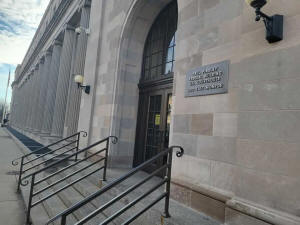Lawsuit threatens Illinois minority teachers scholarship
 [February 26, 2025]
By Jordan Owens and Medill Illinois News
Bureau [February 26, 2025]
By Jordan Owens and Medill Illinois News
Bureau
SPRINGFIELD – Gov. JB Pritzker has proposed continuing
funding for a program aimed at getting more minority teachers in
classrooms as a conservative legal strategist challenges the programs
constitutionality in federal court.
In his proposed budget for the fiscal year of 2026, which begins July 1,
Pritzker proposed $8 million to go toward the Minority Teachers of
Illinois Scholarship Program.
This scholarship program, which has received the same
funding for the past two fiscal years, is the subject of a federal
lawsuit in the Central District of Illinois court. The American Alliance
for Equal Rights, a Texas-based organization whose mission is “to
challenge racial classifications and racial preferences in America,”
filed the suit in October.
AAER is led by Edward Blum, a conservative legal strategist who largely
led the legal effort that resulted in the 2023 U.S. Supreme Court ruling
overturning affirmative action-based decisions in college admissions
programs.
The lawsuit names Pritzker and the Illinois Student Assistance
Commission as defendants. It seeks to declare the race-based portion of
the MTI Scholarship Program unconstitutional and prohibit the state from
enforcing it.
AAER, a member-based organization, argues that it has “one or more
members” who are Illinois residents who would otherwise qualify for the
scholarships but are barred from the program because they are not a
member of a racial minority. The suit cites an unidentified “Member A,”
who it says is a high school student interested in pursuing a career in
education but cannot apply for a scholarship because of their race.

AAER is represented in the suit by the Pacific Legal Foundation, a
nonprofit law firm that focuses on “individual liberty” and promotes
itself as “suing the government since 1973.”
Due to the anonymous subject listed in the lawsuit, the state has moved
to dismiss the case from the central district court. Filed in December,
the state’s motion argues that the plaintiff’s organization “relies on
an injury allegedly suffered by a single unnamed member.”
The scholarship program was created in 1992 to increase the number of
bilingual and non-white teachers in the state. It grants recipients up
to $7,500 per school year for four years of higher education. While in
school the money helps with the cost of tuition, room and board, fees or
commuter expenses. Upon receiving their teacher licensure, recipients
are meant to work at a nonprofit K-12 school in the state with at least
20 English learners or a 30% minority student population.
Since its creation, about 13,700 Illinois high school seniors have
received this scholarship, according to Chalkbeat. The program has
assisted the growth in entry rates for teachers and administrators of
color in various school districts.
In the 2023-2024 academic year, educators of color made up less than 20%
of all teachers, while students of color comprise an average of 54% of
all students in K-12 grades across the state.
Deputy Superintendent of Rock Island-Milan School District Jeff Dase is
a previous recipient of the scholarship. Dase credits his ongoing K-12
education career to this scholarship and others given to him to attend
Chicago State University.
“That’s how I ended up in education, because that fulfilled my goal. My
parents didn’t have to go into debt,” Dase said. “(The scholarship) just
helps out, because a lot of minorities, especially Black males, are
deterred from school and higher education at an early stage, so to give
some assistance draws more people to that avenue.”
Advance Illinois, a public education advocacy group, is just one
organization speaking out against the lawsuit.
[to top of second column]
|

The Paul Findley Federal Building in Springfield houses the U.S.
District Court for the Central District of Illinois. (Capitol News
Illinois file photo)

“The reason that a diverse educator pipeline is
important, specifically when we look at Illinois, I think our educator
workforce is not representative of our student body,” said Maty Ortega
Cruz, senior community engagement associate at Advance Illinois.
Ortega Cruz said there are an increasing number of
barriers to becoming an educator, including the rising cost of higher
education. She said Advance Illinois organized a briefing about the
lawsuit following the October filing.
“We were joined by 100 partners – 100 attendees, so that alone shows how
important, how meaningful and how impactful the program is to other
people who do this work,” Ortega Cruz said.
Illinois legislators in January passed House Resolution 942, which urges
the state to continue administering and supporting the Minority Teachers
of Illinois Scholarship Program, on a 76-18 vote. In hopes of passing a
resolution of the same means and language in the state Senate, Majority
Leader Kimberly A. Lightford, D-Maywood, introduced Senate Resolution
117 on Feb 18.
Ortega Cruz said HR 942 was championed by members of the Illinois
Legislative Black Caucus who reiterated how the scholarship helps close
the representation gap in the education workforce.
“There is a very, very small population of Black men in schools across
the United States,” said Djimon Smith, dean of students at Central
Middle School in Evergreen Park and president of the Black Male
Educators Alliance Illinois Chapter. “We want to increase that. We work
to recruit and retain Black male educators. It’s very important to us
that there are Black males in the classroom to change lots of systemic
barriers and things that impact Black students.”
As of 2024, according to the Illinois Report Card, 6.4% of teachers in
the state were Black, with African American men making up less than half
of that number.
Dase, who is also a member of the alliance’s Illinois chapter, says the
scholarship program is an incentive for college students of color to go
into the education field.
“It gives you that indirect message of saying we want you, so I think
that matters to a lot of people,” Dase said. “It gives you some sense of
a commitment to give back, because you’ve already been invested in, with
this monetary award.”

Other state-funded scholarship programs in Pritzker’s budget proposal
that focus on education career pathways include the Golden Apple
Scholarship of Illinois, open to all high school seniors through college
sophomores in the state, and the Diversifying Higher Education Faculty
in Illinois Program, meant to increase minority full-time tenure track
faculty and staff at two and four-year colleges and universities in the
state.
Jordan Owens is a graduate student in
journalism with Northwestern University’s Medill School of Journalism,
Media, Integrated Marketing Communications, and a Fellow in its Medill
Illinois News Bureau working in partnership with Capitol News Illinois.
Capitol News Illinois is a nonprofit, nonpartisan news service that
distributes state government coverage to hundreds of news outlets
statewide. It is funded primarily by the Illinois Press Foundation and
the Robert R. McCormick Foundation. |